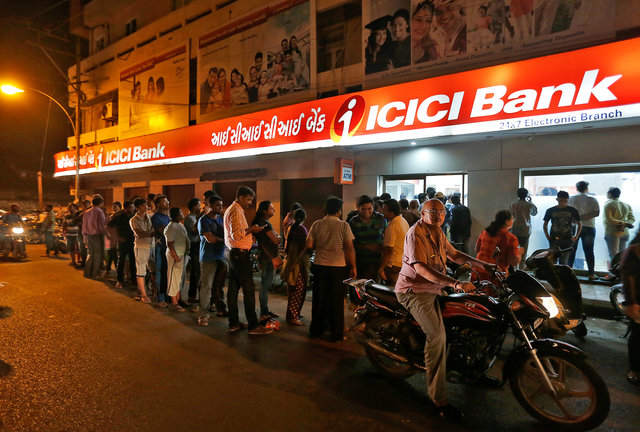India abolishes larger banknotes in fight against graft, “black money”
 People wait to deposit and withdraw their money outside an ICICI Bank ATM in Rajkot, India, November 8, 2016. (Photo: Reuters)
People wait to deposit and withdraw their money outside an ICICI Bank ATM in Rajkot, India, November 8, 2016. (Photo: Reuters) NEW DELHI – Indian Prime Minister Narendra Modi on Tuesday announced that 500 and 1,000 rupee banknotes would be withdrawn from circulation at midnight to crack down on rampant corruption and counterfeit currency.
The surprise move was designed to bring billions of dollars worth of cash in unaccounted wealth into the mainstream economy, as well as hit the finances of militants who target India and are suspected of using fake 500 rupee notes to fund operations.
“Black money and corruption are the biggest obstacles in eradicating poverty,” Modi said in a hastily convened address to the nation after a cabinet meeting.
Nearly 40 percent of India‘s economy is driven by small- and medium-sized enterprises that largely run on cash transactions. Economists said the move could impact these businesses, and in turn have a knock-on effect on economic growth.
There was concern among members of the public about changing larger denomination banknotes for new ones once they expired.

A customer waits to deposit 1000 Indian rupee banknotes in a cash deposit machine at bank in Mumbai, India, November 8, 2016. (Photo: Reuters)
Around a dozen people lined up to use an ICICI cash deposit machine in suburban Mumbai soon after the announcement, trying to deposit bundles of 500 and 1,000 rupee notes.
The machine stopped working after 10 minutes. Only two customers managed to deposit their money, and a security guard informed the rest that the cash dispenser has reached its limit and would not accept any more.
Delhi taxi driver Anu Choudhury said his boss called to say he should not accept 500 or 1,000 rupee notes from customers.
“This is not a good step for business. The prime minister did not think about people like us.”
– Reuters



